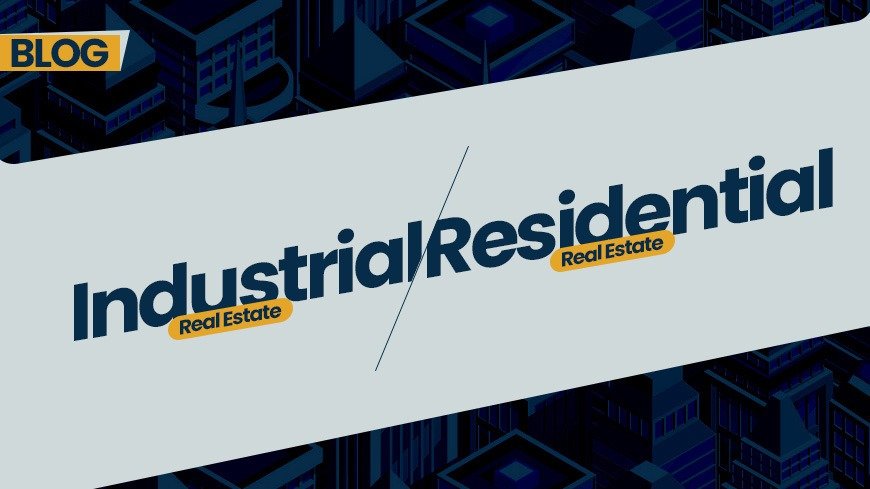- December 1, 2023
- Posted by: Muhammad Afzaal
- Category: Blogs

Introduction
Real estate in Pakistan entails a closer examination of the significant differences between the industrial and residential sectors. While residential real estate primarily focuses on housing and living spaces, industrial real estate encompasses properties intended for manufacturing, production, and logistics.
Understanding Real Estate in Pakistan
Pakistan’s real estate market is diverse, comprising various sectors like industrial and residential properties. Understanding the fundamental differences between industrial and residential real estate is crucial for investors, developers, and policymakers alike.
What is Industrial Real Estate?
Industrial real estate refers to land and structures utilized for manufacturing, warehousing, distribution, and research purposes. These properties include factories, warehouses, industrial parks, and specialized facilities tailored for industrial operations.
What is Residential Real Estate?
Residential real estate refers to properties or buildings designed and used for housing purposes. It includes various types of homes intended for living, such as single-family houses, condominiums, apartments, townhouses, and duplexes.
Exploring Residential Real Estate
Residential real estate comprises properties built for habitation, including single-family homes, condominiums, apartments, and townhouses. The key aspects revolve around providing comfortable living spaces, amenities, and community features.
The residential real estate market is influenced by factors such as demographics, population growth, location desirability, interest rates, and employment opportunities. Housing trends, lifestyle changes, and urbanization also significantly impact this sector.
Read: Commercial Plots Versus Residential Plots In Lahore Smart City
Comparative Analysis: Industrial vs. Residential Real Estate
Investment Prospects
When considering investment prospects, industrial real estate often provides stable long-term income due to lease agreements with companies requiring specific spaces for their operations. Residential real estate, on the other hand, offers diverse investment options, including rental income, property appreciation, and short-term rentals.
Market Trends
Market trends and cycles play a crucial role in both sectors. Industrial real estate tends to exhibit steadier growth during economic fluctuations, while residential real estate experiences shifts in demand affected by economic conditions, interest rates, and demographic changes.
Risks and Opportunities
Industrial real estate presents opportunities through increased e-commerce activities, technological advancements in logistics, and the growing need for efficient supply chains. However, it might face challenges with environmental regulations and economic downturns impacting manufacturing.
Residential real estate offers stability through a consistent demand for housing but might face risks during economic downturns affecting homeownership rates, mortgage rates, and affordability.
Future Outlook
The industrial real estate sector is poised for growth, fueled by advancements in technology, increased globalization, and the evolution of supply chain strategies. The demand for strategically located industrial spaces is expected to rise with the expansion of e-commerce and logistics sectors.
Residential real estate will continue to evolve with changing demographics, preferences for sustainable living spaces, and technological integrations enhancing home experiences.
Economic Impact
Industrial real estate contributes significantly to job creation, economic development, and infrastructure growth. Conversely, residential real estate fuels housing stability and societal well-being.
Challenges Faced in Each Sector
Industrial real estate faces challenges related to infrastructure development and regulatory hurdles. Residential real estate grapples with affordability issues, urban sprawl, and zoning regulations.
Government Policies and Regulations
Governmental policies significantly influence the configuration of the real estate environment. Policies favoring industrial growth or promoting affordable housing directly impact the respective sectors.
Future Outlook
The industrial real estate sector is poised for growth, fueled by advancements in technology, increased globalization, and the evolution of supply chain strategies. The demand for strategically located industrial spaces is expected to rise with the expansion of e-commerce and logistics sectors.
Also Read: How To Get The Best Deal On A Commercial Property?
FAQs
Q1. Is investing in industrial real estate more profitable than residential real estate?
Ans: Investment profitability depends on various factors like location, market demand, and investor goals. Each sector provides distinctive chances for investors.
Q2. How do government policies impact industrial and residential real estate differently?
Ans: Government policies influence land use, taxation, incentives, and development regulations, impacting both sectors differently based on their objectives.
Q3. What challenges does residential real estate face in Pakistan?
Ans: Residential real estate in Pakistan faces challenges such as affordability concerns, urban planning issues, and the need for sustainable housing solutions.
Q4. Are there specific areas in Pakistan more suitable for industrial development?
Ans: Yes, certain regions in Pakistan are designated as industrial zones, offering infrastructure, tax incentives, and facilities conducive to industrial growth.
Q5.What are the emerging trends in Pakistani residential real estate?
Ans: Emerging trends include eco-friendly housing, smart home technologies, and the development of mixed-use communities catering to diverse lifestyles.
Conclusion
In conclusion, the differences between industrial and residential real estate in Pakistan lie in their purposes, economic contributions, market dynamics, and regulatory environments. Understanding these distinctions is crucial for stakeholders aiming to navigate the diverse real estate landscape effectively.
